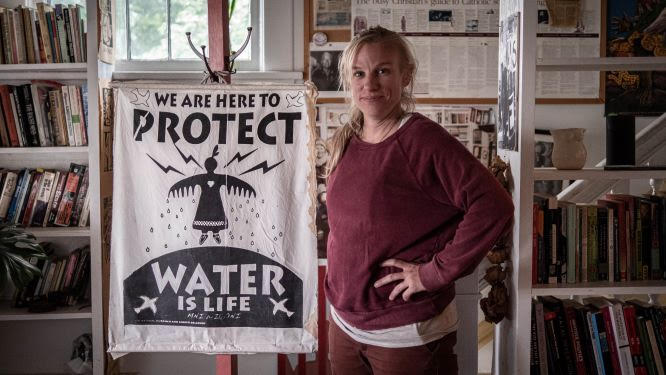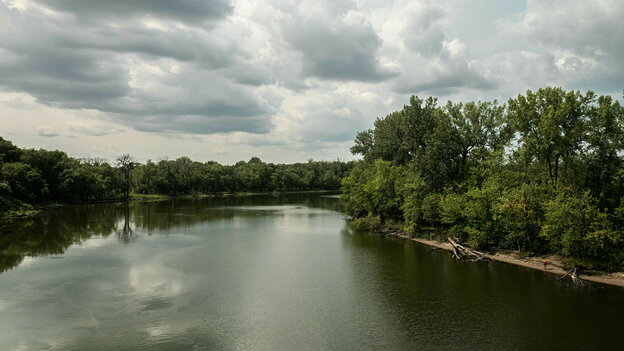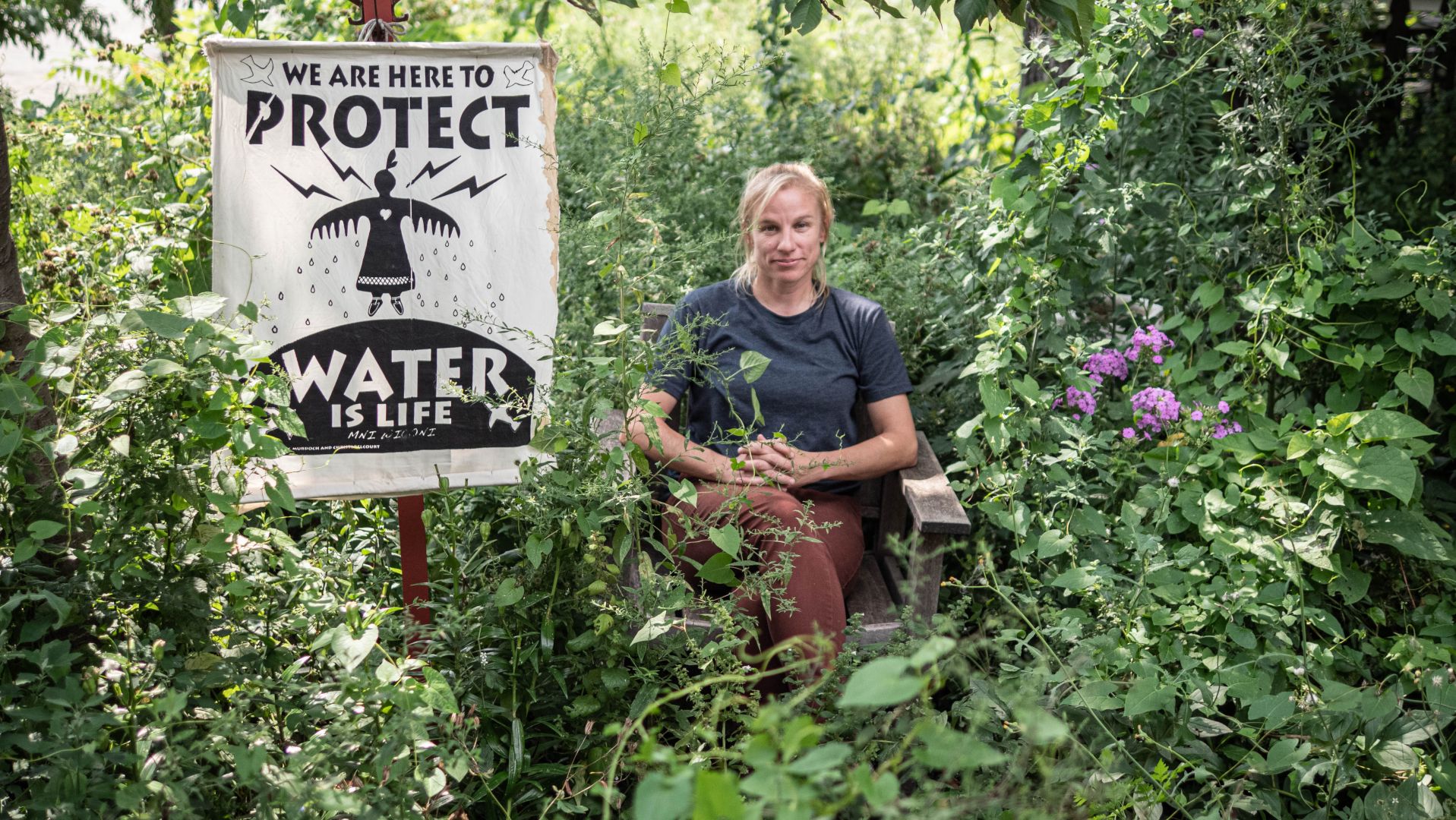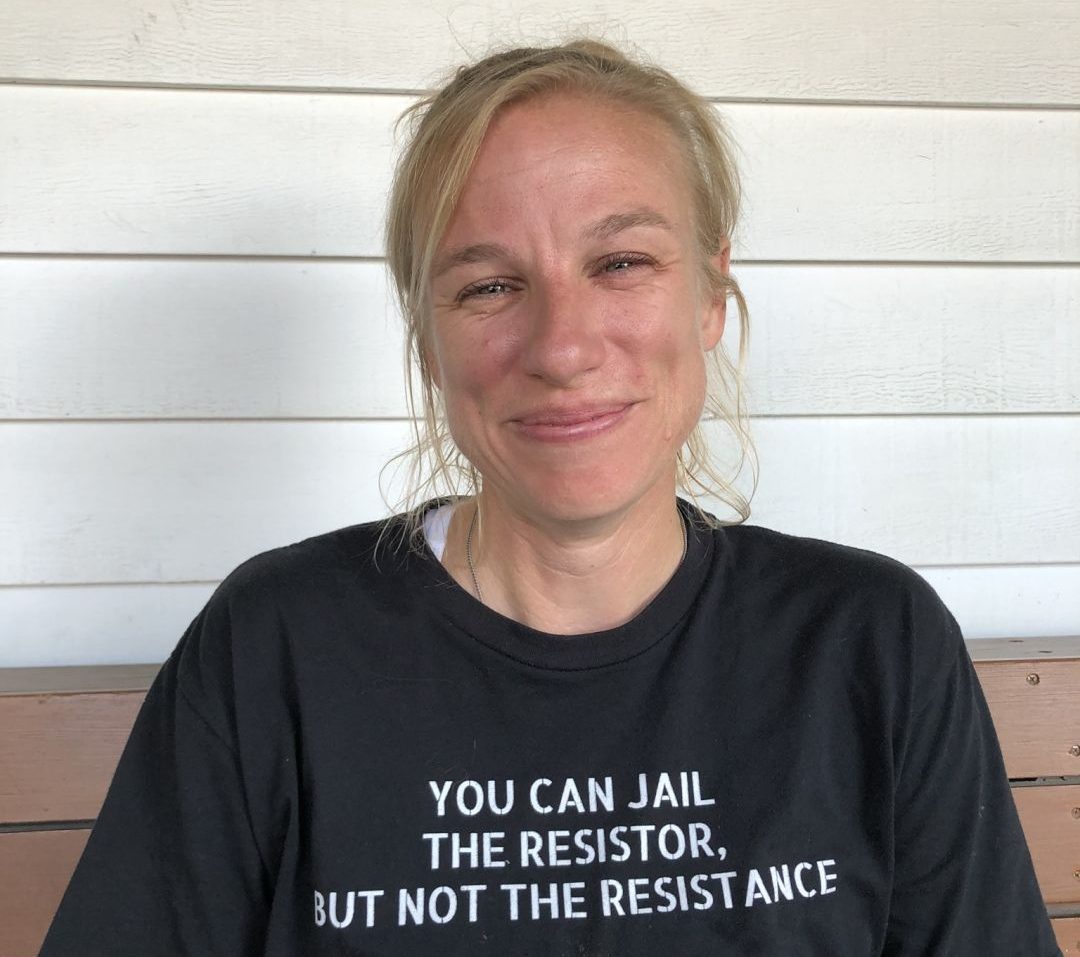
by DGR News Service | May 12, 2022 | ACTION, Property & Material Destruction
Oral arguments for a federal appeal in the high profile case of environmental activist Jessica Reznicek will be heard by the 8th circuit court of appeal on May 13. In a defining moment for the climate justice movement and for all civil rights, the court will decide whether or not to uphold a “domestic terrorist enhancement” that an Iowa court applied to Reznicek’s prison sentence. Reznicek is expected to argue that the terrorism enhancement was both illegally and unjustly applied.
In 2016, Jessica Reznicek took action to stop the construction of Dakota Access Pipeline by dismantling construction equipment and pipeline valves. In 2021 she was sentenced to 8 years in prison with a domestic terrorism enhancement.
Under normal conditions Jess would have been sentenced to 37 months, but the terrorism enhancement resulted in a sentence of 96 months. She was also ordered to pay $3.2 million in restitution to Energy Transfer corporation.
The appeal is supported by the Center for Constitutional Rights (CCR), National Lawyers Guild, Water Protectors Legal Collective, and the Climate Defense Project. “If Jessica Reznicek’s acts can be punished as terrorism,” says an amicus brief filed by CCR, “the United States will have moved so far past the international consensus as to be operating in a completely different realm.”
- WHAT: Oral arguments for federal appeal, U.S.A. v. Jessica Reznicek. Case # 21-2548
- WHO: United States Court of Appeals- 8th Circuit, DAPL activist Jessica Reznicek
- WHEN: Friday, May 13 at 8:30 CST
- WHERE: St Paul, Minnesota United States Court, Courtroom 5A. Closed to the public in person. Listen in by calling 1-888-363-4749 Code 4423562. Jessica Reznicek is 5th on the docket.
In 2017 Jessica Reznicek and a partner from the Catholic Worker Movement publicly claimed responsibility for acts of vandalism against the Dakota Access Pipeline. In February, 2021 she pled guilty to a single count of Conspiracy to Damage an Energy Facility. In June, 2021 an Iowa judge imposed a “terrorism enhancement” at the prosecution’s request and sentenced Reznicek to 8 years in prison with restitution of over $3 million to be paid to Energy Transfer LLC. No one was injured by Reznicek’s acts of civil disobedience.
Although federal courts have ruled the Dakota Access Pipeline was constructed illegally, excessive punishment for people like Jessica, who tried to stop it, is on the rise – and scrutiny is growing of fossil fuel industry influence in the process. Wrote Jessica in a 2021 statement to the court, “I am not a political person. I am certainly not a terrorist. I am simply a person who cares deeply about an extremely basic human right that is under threat: Water.”
To support Jess’s legal case, visit https://supportjessicareznicek.com/.
Photo: Occupy Des Moines – Day 113: Jess Reznicek Arrested, by Justin Norman. Attribution-NonCommercial-ShareAlike 2.0 Generic (CC BY-NC-SA 2.0.

by DGR News Service | Dec 5, 2021 | Direct Action, Human Supremacy, Mining & Drilling, Property & Material Destruction, Repression at Home, The Problem: Civilization, The Solution: Resistance
Sentenced to eight years in prison for acts of sabotage, water protector Jessica Reznicek reflects on her faith-driven resistance.
By Cristina Yurena Zerr
This article was first published in the German newspaper taz, and has been translated and edited for Waging Nonviolence.
On June 28, the federal court in Des Moines, Iowa was silent and filled to capacity. Fifty people were there to witness the sentencing of 40-year old Jessica Reznicek, charged with “conspiracy to damage an energy production facility” and “malicious use of fire.” The prosecution, asking for an extended sentence, argued that Reznicek’s acts could be classified as domestic terrorism.
This was not the first time Reznicek had been on trial, but this time she was facing a prison sentence of up to 20 years.
Sitting across from her was U.S. District Court Judge Rebecca Goodgame Ebinger, the prosecutor and an FBI agent. Numerous police officers in bulletproof vests stood around the courtroom. The defendant was called upon to give her closing speech.
In her loud, clear voice, Reznicek told them about her strong connection to the water. In her childhood she regularly went to the river to swim and play. But that’s no longer possible, she said, because the two rivers that run through Des Moines — Iowa’s capital — are now poisoned by agrobusiness pesticides and waste.
It was for these very personal reasons that she decided to fight the construction of the Dakota Access Pipeline, Reznicek told those in attendance. At least eight leaks, she explained, had already occurred in 2017, with 20,983 gallons of crude oil leeching into soils and the waterways. “I was acting out of desperation,” she said, describing her motivations for sabotage.
“Indigenous tradition teaches us that water is life. Scripture teaches that in the beginning, God created the waters and the earth and that it was good.” With these words, she ended her closing argument. The prison sentence followed shortly thereafter: eight years in federal prison, three years of probation, and a restitution of $3,198,512.70 to the corporation Energy Transfer.

The Des Moines River (Cristina Yurena Zerr)
On July 24, 2017 — two years before sentencing — Jessica Reznicek can be seen in a shaky video with her activist partner Ruby Montoya, a former elementary school teacher who was 27 at the time. They stand in front of a group of journalists next to a busy street. The speech they give would drastically change their lives.
After several months of secretly sabotaging one of the country’s most controversial construction projects, the two women, whose paths would later part, went public. “We acted for our children because the world they inherit does not meet their needs. There are over five major bodies of water here in Iowa, and none of them are clean. After having explored and exhausted all avenues of process, including attending public hearings, gathering signatures for valid requests for environmental impact statements, participating in civil disobedience, hunger strikes, marches and rallies, boycotts and encampments, we saw the clear refusal of our government to hear the people’s demands.”
That’s why Reznicek and Montoya burned five machines at a pipeline construction site in Iowa on election night in November 2016. They would later change their methods, using a welding torch to dismantle the pipeline’s surface-mounted steel valves, delaying construction by weeks. “After the success of this peaceful action, we began to use this tactic up and down the pipeline, throughout Iowa,” the two women say.
But no media reported on their activities; the corporation cited other — false — reasons for the delay. When the activists noticed during an action that oil was already flowing in the pipes, they decided to go public, as they had to admit a kind of defeat.
The two women appear clear and determined on this day in the summer of 2017 as they take turns reciting their pre-written text. “If there are any regrets, it is that we did not act enough.” They end their speeches and are led away in handcuffs by three police officers.
Using the slogan “Mni wiconi,” meaning “Water is Life,” in the Lakota (Sioux) language, a broad movement was organized in 2016 against the construction of the Dakota Access Pipeline. The protest of the Standing Rock Sioux tribe garnered national and international attention.
The tribe sees the construction of the pipeline as a threat to their water supply because the pipeline runs under Lake Oahe, which is near the reservation. Other bodies of water are also at risk because the pipeline crosses under rivers and lakes in many places, which could contaminate the drinking water of many people in the event of an accident. In addition, ancient burial sites and sacred places of great cultural value would be threatened by the construction. Opponents of the pipeline speak of ecological racism — not only because Indigenous rights to self-government would be curtailed, but also because the construction of so-called Man Camps (temporary container cities for construction workers who move from other states) would lead to prostitution and an increase in violence against Indigenous women.
Their government — the Sioux Tribe is a sovereign nation — issued a resolution back in 2015 saying the pipeline “poses a serious risk to the very survival of our tribe and […] would destroy valuable cultural resources.” Construction would also break the Fort Laramie Treaty, which guarantees them the “undisturbed use and occupation” of reservation land. But their arguments went unheard by both the company and the government.
The operating company said the pipeline would not harm the environment, would not affect Indigenous rights and would not pose a threat to drinking water supplies. But the protest, which stretches across several states along the pipeline, has developed into one of the largest environmental movements in the United States. Native Americans from different nations and reservations are joining, along with landowners, environmental organizations and left-wing autonomous movements.
Reznicek first heard about the pipeline when she was released from prison six years ago, after serving a two-month stint for her protest against a U.S. military weapons contractor in Omaha, Nebraska. An organizer from Standing Rock had come to Des Moines to mobilize people for the protest. “I decided that I wanted to learn more about Indigenous ceremony, understanding that I am a white person, I cannot just go in and express my demands. And I also wanted to focus on stopping the Dakota Access Pipeline Project. So I drove up to Standing Rock.”
Where it all began
On a road on the outskirts of Des Moines — a city home to numerous insurance companies — large trees tower above the wooden row houses, providing shade on a hot July day.
Above the porch of one of the houses hangs a small sign that reads “Catholic Worker House.” In front of the back part of the building are tables and benches with people sitting on them. Music is playing, people are singing, someone is asleep on a bench.
In the kitchen of the house, Jessica Reznicek stands in front of the stove and slices five chicken breasts, freeing the meat from the bones. Next to them is a large pot of mashed potatoes, into which she generously spreads butter. “Our guests love butter,” Reznicek laughs. The kitchen looks as if many meals have been cooked there. Posters with anti-war messages and protest slogans are hung around the small room. On the windowsill in front of Reznicek is a statue of a bishop with a rosary around his neck.
Twice a week, Jessica Reznicek cooks for the homeless guests who come here. Usually they eat together in the living room, but since the outbreak of the coronavirus pandemic, the food is distributed through the window.
“I like the days when I’m in charge of the kitchen. It takes my mind off all the things that are going on in my head,” Reznicek says as she begins washing a mountain of dishes.
Two years have passed since her protests were made public. A year ago, Jessica Reznicek moved back into the community, spending time there on house arrest. Here, where it all began, her long journey ends. She has one week left before needing to report to prison.
Just before the food is served, the kitchen and living room fill up. Two of Reznicek’s friends are there, residents of the house and volunteers from outside — together they begin to serve food to the guests.
Reznicek has been in and out of the house for 10 years. Most people know her story: “The one who blew up the pipeline?” asks Jimmy — one of the homeless guests — laughing as he tastes the still-warm mashed potatoes. The fact that she will soon be gone saddens many of the residents. For the majority of them, prison is a familiar place. But no one here has been incarcerated as long as Jessica Reznicek will be.
The Dingman House, named after a late bishop in Des Moines, is one of four side-by-side buildings of the Catholic Worker community. Christianity and anarchism meet here. In these self-organized “houses of hospitality,” which function independently of the church, people live and work among the poor in the spirit of the Sermon on the Mount. The Christian message of social justice and solidarity with the marginalized becomes everyday practice. There is not much overlap with the institutional Catholic Church. In the bathroom, where homeless guests can shower, there are free condoms; trans people find shelter here and women sometimes lead church services.
Preparations for prison
The Berrigan House across the street — named after two priests who became known for their actions of civil disobedience against the Vietnam War — has always been a place of resistance, where protest actions are planned and activists find shelter. This is where Reznicek prepared her actions against the pipeline.
As in the house next door, the walls are covered with posters calling for resistance against war, racism and injustice. It is a colorful, chaotic and untidy atmosphere. Reznicek and her friends Alex and Monty sit at the table in the living room. The two are among her closest supporters. They just had a video conversation with Reznicek’s lawyer to discuss the final steps before she goes to jail.
A month after Reznicek is sentenced to eight years in prison, they launched a campaign called “Water Defenders Are Never Terrorists.” Within a few weeks, they were able to collect thousands of signatures. Their goal: a petition to President Joe Biden and Congress demanding the terrorism charges be dropped.
The list of things to do before Reznicek goes to prison is long: return the electronic ankle bracelet, pick up the copy of her high school transcript she needs so she won’t have to attend classes in jail. T-shirts demanding her release are to be printed. Reznicek also wants to develop photos that Alex will later send to her in prison so she can decorate her cell with them. But they also want to see her favorite musical Rent, go dancing one more time, invite friends and celebrate. There is a lot of laughter when the three get together.

Jessica Reznicek’s supporters Monty and Alex in the Christian Berrigan House. (Cristina Yurena Zerr)
After the meeting, Jessica Reznicek packs a vacuum cleaner and cleaning supplies and heads out. With permission from her probation officer, she started cleaning private homes a year ago. She also worked at a pizzeria from time to time.
Why is Jessica Reznicek willing to spend eight years of her life in prison because of her commitment to clean water? She was studying political science in Des Moines and married when she learned about the Occupy Wall Street movement in 2011. Shortly after, she decided to go to New York for the protests. This meant the end of her marriage. From the East Coast, she began a new life of sorts, always on the move, searching for a way to make her contribution to a more just world.
Reznicek traveled twice to Palestine and Israel, where she was deported for protesting in solidarity with the Palestinian people. She visited the Zapatistas in Mexico and spent time in Central America with the Indigenous people of Guatemala. In South Korea, she protested the construction of a U.S. Navy base. “So I feel like all of these experiences culminated at this point in my life when I heard about the Dakota Access Pipeline.”
The Catholic Worker community in Des Moines was central to her politicization. She stumbled upon the organization after returning to Iowa from New York. There begins what she later calls a conversion: a return to the Christian faith and her Catholic roots. At the same time, this means a radicalization in the struggle against injustice: Jesus Christ is seen Catholic Workers as a revolutionary who stood up for the disenfranchised, for the weak and the poor. He wanted to drive the kings from their thrones and bring justice. And he died on the cross without resisting his judgement.
Three months after Jessica Reznicek made her actions public in 2017, the Berrigan home was surrounded by the FBI. “It was like 4:30 in the morning when they were pounding on the door. The house was actually shaking. I ran downstairs and could see around 50 agents through the window with big guns and vests.”
When she opened the door, the house was stormed by about 50 uniforms. She was thrown to the ground and held at gunpoint, she said.
She then spent a year in hiding, calling it her wanderings. “I wasn’t necessarily underground. I think that I was running and I was hiding, but it was not exclusively from the federal government. I was not hiding from prison. I was hiding from everything.”
When she broke down after 10 months in Colorado, she finally realized she needed help. It won’t come from people or places, Reznicek says, but from her relationship with God. After this experience, she realized she wanted to live in a place where she could encounter God, so she decided to enter a Benedictine convent as a novice. But no sooner does she arrive than Reznicek is again picked up by the FBI and charged. They send her back to Des Moines — to the Berrigan home — to await the verdict under house arrest.
For the last four days before she goes to prison, Jessica Reznicek was given permission to visit the sisters at the convent community in Duluth. After her incarceration, she would like to move there or — if that’s not possible — live as close to the convent as she can.
On August 11th, Benedictine sisters drove Jessica Reznicek to the women’s prison in Wascea, Minnesota, four hours away. There, 714 women currently live behind the walls and fences.
Three hundred miles to the north is the town of Bemidji, home of Energy Transfer, the energy company to which Reznicek will be in debt for the rest of her life. A new pipeline called Line 3 has been under construction at this location for several years. As with the Dakota Access Pipeline, the region’s Indigenous inhabitants — the Anishinaabe and Ojibwe tribes — will be most affected by the project.
“Today I feel sad to be saying my final goodbyes to loved ones,” Reznicek said. “I am strengthened, however, knowing that I’m still standing with integrity during this very important moment in history, as there truly is no other place to be standing at a time like this.”
With these words she takes leave of her friends and turns to face the prison gates.

by DGR News Service | Nov 18, 2021 | Biodiversity & Habitat Destruction, Climate Change, Culture of Resistance, Direct Action, Movement Building & Support, Property & Material Destruction, Repression at Home, Toxification, Women & Radical Feminism
By Max Wilbert
On July 24th, 2017, Ruby Montoya and Jessica Renzicek made a public statement admitting that they had carried out multiple acts of sabotage against the then-under-construction Dakota Access Pipeline (DAPL) in Spring 2017 during the #NoDAPL #StandingRock movement. The two activists set fire to heavy machinery and used blow torches to damage the oil pipeline and valves in an effort to decisively halt the project.
While the Dakota Access Pipeline was ultimately completed, their actions singlehandedly delayed construction for months. Jessica and Ruby are calling on others to consider similar tactics in their struggles against pipelines and other destructive projects.
On June 30, Jessica was sentenced to eight years in prison. Now, Ruby is scheduled to appear in Federal Court to argue that Energy Transfer Partners lied and demonized her and Jessica to try and get them locked up as “eco-terrorists.” Her defense, if successful, could set important legal precedents for eco-activists around the country.
To do this, she needs financial help. Please donate here to support Ruby’s legal defense. Funding will go directly to her attorney, Daphne Silverman.
DONATE:
https://www.gofundme.com/f/nodapl-water-protector-ETP
RUBY MONTOYA SUPPORT WEBSITE:
https://justice4ruby.com/
JESSICA REZNICEK SUPPORT WEBSITE (Jessica is now a political prisoner and we encourage supporters to write letters to her):
https://supportjessicareznicek.com/

by DGR News Service | Oct 15, 2021 | Biodiversity & Habitat Destruction, Direct Action, Indigenous Autonomy, Mining & Drilling, Property & Material Destruction, Repression at Home, Toxification
This article originally appeared in Common Dreams.
By JULIA CONLEY
“Not a single drop of oil is going to come out of the Amazon until the government takes care of us,” said campaigners.
Demanding stronger social and environmental support in northern Peru’s Loreto region, about 200 Indigenous protesters on Wednesday announced a strike two days after they began occupying a station of the North Peruvian Oil Pipeline controlled by state-owned oil company Petroperu.
The strike will continue until President Pedro Castillo, who took office in July and has pledged a redistribution of wealth from mining projects to help local communities, fulfills the Indigenous people’s demands, said the Indigenous Association for Development and Conservation of Bajo Yurimaguas (AIDCBY).
“Not a single drop of oil is going to come out of the Amazon until the government takes care of us,” said AIDCBY.
The group, as well as the Awajun Native Federation of the Apaga River (FENARA) and the Peoples Affected by Oil Activity (PAAP), are demanding the establishment of a trust fund to finance the cleanup of areas affected by oil spills as well as education and healthcare services in the region.
Official statistics show that at least 37 spills from the pipeline were recorded between 1996 and 2016.
According to the environmental protection group EarthRights International, local communities have been affected by major declines in crop yields and contaminated drinking water and have reported “a number of health problems stemming from the contamination, including nausea, migraines, vomiting, stomach pain, skin rashes, and even miscarriages among pregnant women; tests have confirmed contaminants in blood and urine.”
The demonstrators called on Castillo and Energy Minister Ivan Merino to travel to Station 5, the pipeline station the groups have taken over. According to Telesur English, FENARA on Wednesday said the government should not “provoke with a police deployment” but instead allow for “the implementation of an intercultural dialogue.”
Last year, three Amazonian Indigenous people were killed and 17 demonstrators were injured after Peruvian security forces responded to protests over a pipeline run by Canadian firm PetroTal.
Petroperu’s pipeline transports crude oil from northern Peru’s Amazon regions to a refinery on the country’s Pacific coast. The company was forced to halt the pumping of oil this week as the groups took over Station 5.
Ismael Pérez Petsa, a leader of the Lower Puinahua Indigenous Development and Conservation Association, told Radio La Voz de la Selva Wednesday that the outcome of the protest is now in the Castillo administration’s hands.
“Now we’ll see the real face of the executive who campaigned about supporting Indigenous peoples,” Pérez Petsa said. “The ball is with them and today it’s [a] government political decision.”
Photo by Dimitry Anikin on Unsplash

by DGR News Service | Aug 15, 2021 | Direct Action, Movement Building & Support, Property & Material Destruction, Repression at Home
Update from July 23, 2021
Contact: freejessicareznicek@gmail.com
Facebook: https://www.facebook.com/freejessrez
Website: Supportjessicareznicek.com
Featured image photo credit: Christina Yurena Zerr
Since sentencing Jessica has remained on house arrest at the Des Moines Catholic Worker, with her cat Noni who has offered constant comfort and solidarity. The United States Department of Justice has notified Jessica Reznicek that she is scheduled to report to Waseca, MN Federal Correctional Institution on Aug 11th at 2pm. Our hearts are filled with feelings of love and gratitude from all the requests to write letters of support to Jessica. Once she is in prison we will launch a letter writing campaign with all the information and directions on how to do so.
The 8th Circuit United States Court of Appeals has set a preliminary deadline of August 19th for an appeals brief to be filed. The appeal will be focusing on Judge Rebecca Goodgame Ebinger’s misuse of terrorism enhancements at Jessica’s sentencing.
Despite federal authorities use of ‘terrorism’ language to describe Reznicek’s actions, no person was harmed by her actions, nor was she technically convicted of any terrorism-related crime. In plain language, there are already laws on books to punish people for arson, and without the domestic terrorism enhancement Jessica would be looking at less than half of the 8 year sentence she has wrongfully received.
ADD YOUR NAME TO THE PETITION: https://actionnetwork.org/petitions/protecting-water-is-never-terrorism-repeal-jessica-rezniceks-terrorist-enhancement?source=direct_link&
In the meantime, Jessica remains upbeat and heart-strong as she is receiving enormous amounts of support, solidarity and love from folks around the globe. She is currently exploring ways to earn her bachelor degree while in prison through prison correspondence education programs. For more information on Jessica’s case and to continue to support Jessica visit our website: supportjessicareznicek.com
If you are on organization that would like to add your name to the petition or support team fill out this form: https://forms.gle/EVP17qvNmgp5AYRRA
Thank you for your support!

Love and solidarity,
Jessica and the Jessica Support Team
Update from August 11, 2021
Jessica Reznicek self surrenders for an unjust sentence: appeal and petition move forward.
Contact: freejessicareznicek@gmail.com
Waseca, MN– Today water protector Jessica Reznicek self-reported to the Waseca Federal Correctional Facility to begin serving her 8 year prison sentence for the actions she took to stop the Dakota Access Pipeline. Jessica spent the week leading up to her imprisonment emotionally preparing with her spiritual community. When asked how she felt she said:
“Today I feel sad to be saying my final goodbyes to loved ones. I am strengthened, however, knowing that I’m still standing with integrity during this very important moment in history, as there truly is no other place to be standing at a time like this.”
Jessica’s harsh sentence was the result of a domestic terrorism enhancement that federal prosecutors are increasingly using against water protectors and climate justice activists who endanger the fossil fuel industries profits. Jessica is still actively pursuing an appeal. Her lead attorney Bill Quigley gave an update: “The legal team is working hard on this appeal to challenge the length of the sentence and to reverse the terrorism enhancement. A number of environmental organizations have agreed to consider signing onto amicus or friend of the court briefs supporting Jessica. The deadline for filing briefs is currently August 19 but we expect that will be pushed back at least a month.”
Jessica and her support team are asking the public to sign this petition to take a stand against the criminalization of water protectors. So far over 5,600 have signed along over 50 organizations including Veterans for Peace, MN350, National Lawyers Guild, CODEPINK, Chesapeake Climate Action Network, About Face: Veterans Against the War, and Center for Protest Law and Litigation.
A statement from the support team read “It is important to highlight this moment. Only days ago the Intergovernmental Panel on Climate Change released their most dire report yet, calling it a code red for humanity. We’re in a moment when scientists, indigenous people, and global ecosystems sound the alarm, and over a dozen state governments in the US introduce critical infrastructure bills targeting pipeline protestors under the guise of “national security”. A moment when the sheriffs and police in Minnesota arrest over 600 people fighting to stop the Line 3 pipeline and charge 100 with the new critical infrastructure laws and dozens more with felonies. A moment when a federal judge orders Jessica Reznicek to pay 3.2 million in restitution to a fossil fuel corporation responsible for building a world that humans cannot survive in, a moment when, today, Jessica reports to prison to start an 8 year sentence labeled a terrorist by Joe Biden’s Department of Justice. What happens to Jessica, happens to all of us! In this moment we must unequivocally tell Joe Biden protecting water is never terrorism. Acting on clear directives from climate science with direct action is never terrorism. ”
When life on this planet is under attack, as Jessica says “there truly is no other place to be standing at a time like this.”
Add your name to the Petition:
https://actionnetwork.org/petitions/protecting-water-is-never-terrorism-repeal-jessica-rezniceks-terrorist-enhancement
For more information on Jessica’s case and to continue to support Jessica visit our website: supportjessicareznicek.com
If you are on organization that would like to add your name to the petition or support team fill out this form: https://forms.gle/EVP17qvNmgp5AYRRA
###

by DGR News Service | Jul 30, 2021 | Direct Action, Movement Building & Support, Property & Material Destruction
By Paul Deaton in the Blog for Iowa.
Jessica Reznicek, a 39-year-old environmental activist and Catholic Worker from Des Moines, Iowa, was sentenced in federal court June 30 to eight years in prison for her efforts to sabotage construction of the Dakota Access pipeline.
In November 2016, Reznicek and Ruby Montoya, a former preschool teacher, set fire to heavy construction equipment at a pipeline worksite in Buena Vista County, Iowa.
Over the next several months, the women used oxyacetylene torches, tires and gasoline-soaked rags to burn equipment and damage pipeline valves along the line from Iowa to South Dakota. Their actions reportedly caused several million dollars’ worth of damage and delayed construction for weeks.
Continue reading this article in the Blog for Iowa









